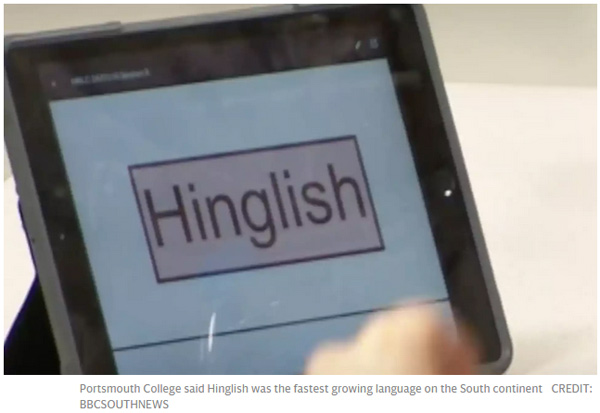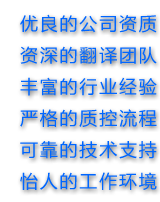学中文还不够 英国大学又开印度英语课
过去,我们觉得讲一口标准的英语很重要,但现在,随着新经济体的崛起,英国人不但热衷于学习中文,还开始学习那些带有他国语言特色的非正规英语了,目的就是在跨国贸易中占据优势。
|

截图来自每日电讯报 |
Hinglish lessons are being taught in UK colleges for the first time to help young Britons win business in India.
英国大学首次开了印度英语课,以帮助英国年轻人在印度发展。
Portsmouth College has introduced a new course for the language, a hybrid of English and Hindi, that has been spoken on both continents since the 17th century. It is widely used today in Indian business, films, music, and advertising.
朴次茅斯学院开了一门新的语言课,这门语言是英语和印度语的混合物,称为Hinglish。从17世纪开始欧亚大陆就有人讲这种印度英语,如今,这种印度英语广泛应用于印度商务、电影、音乐和广告中。
Hinglish is a fusion of the two languages that is preferred by India's booming business community, meaning learning it could be suitable for students looking for international opportunities in the world's seventh largest economy, which is growing more rapidly than any other.
印度英语是两种语言的杂烩,是印度蓬勃发展的商业领域通行的语言,这意味着学印度英语将有利于学生在印度寻找跨国商机。印度是世界第七大经济体,发展的速度比其他任何经济体都要快。
Portsmouth College said Hinglish in turn was the fastest growing language on the South continent.
朴次茅斯学院表示,印度英语是南亚大陆上发展得最快的语言。
"Films are being watched by a lot of Indian people and right from the titles to the script, everything is in Hinglish," teacher Viraj Shah explained.
该校老师维拉杰·沙解释说:“很多印度人都看电影,从片名到字幕,用的都是印度英语。”
James Watters, a department head at the college, said: "It's great to hear that our future generation of workers are taking into account things that are happening around us."
该学院的一名系主任詹姆斯·瓦特斯说:“得悉我们的下一代劳动人口能感知我们周边正在发生的事情,很令人欣慰。”
He said the course would make them "socially aware and better prepared for situations they may be faced with."
他说,这门课程能让学生们“对自己可能要面对的社会形势有感知并做好准备。”
According to Collins English Dictionary, a number of common English words have in fact been influenced by Hinglish. These include the words "shampoo", from the Hindi word for massage or knead; "cushy", which stems from the Hindi word for pleasant; "cot" which originates from the Hindi word for hammock or bedstead; and "thug" from the Hindi word for cheat or thief.
根据《柯林斯英语词典》,不少常用的英语单词其实都受到了印度英语的影响。这其中就包括单词shampoo(洗发香波),这个词原来是印度语,意思是按摩或揉捏;单词cushy(轻松的)也源自印度语,意思是“愉快的”;单词cot(简易床),在印度语中的意思是吊床或床架;还有thug(暴徒),在印度语中的原义是欺骗或偷窃。
Common Hinglish phrases, with borrowed British words, include: "Time kya hua hai?" - which means "what is the time right now?"; and "I have hazaar things on my mind right now" which means "I have a thousand of things on my mind right now."
常用的含有英语舶来语的印度英语短语包括Time kya hua hai?,意思是“现在是几点钟?”还有I have hazaar things on my mind right now,意思是“我现在脑中千头万绪”。
While there is evidence of Hinglish being around since the 17th century, and featuring in poetry in 19th Century, it took off notably as part of popular culture in the 1990s with the rise of music channels like MTV. It is now said to be ubiquitous in Bollywood film.
有证据显示从17世纪起印度英语就已经存在了,而且还出现在19世纪的诗歌中,20世纪90年代随着MTV等音乐频道的兴起,印度英语作为流行文化的一部分使用量也显著增加。如今,据说印度英语在宝莱坞电影中无处不在。
|

截图来自每日电讯报 |
Examples of Bollywood films using Hinglish in the titles include "Ek Tha Tiger" (Once There was a Tiger), "Love Aaj Kal" (Love Today Tomorrow) and "Shaadi Ke Side Effects" (The Side Effects of Marriage).
宝莱坞电影在片名中使用印度英语的例子包括Ek Tha Tiger(从前有只虎),Love Aaj Kal(爱在今天与明天),还有Shaadi Ke Side Effects(婚姻的副作用)。
来看看几个常用的印度英语词汇:
"Chuddies" - underpants 内裤
"Airdash" - to go somewhere very quickly 迅速去某地
"Timepass" - to pass time 打发时间
"Chaivanist" - a person who is extremely fond of chai tea 非常喜欢印度拉茶(香料印度茶)的人
"Prepone" - a word used to describe the opposite of postpone, i.e. bringing a meeting forward 延迟的反义词,比如,将会议提前
"Glassi" – thirsty 口渴
Hinglish is not the only English fusion language. West African Pidgin English is spoken by millions of people in countries including Nigeria, Ghana, Equatorial Guinea and Cameroon.
印度英语不是唯一和英语混合而产生的语言。全球有数百万人讲西非洋泾浜英语,包括尼日利亚、加纳、赤道几内亚和喀麦隆等国家。
Around half the Nigerian population are known to understand the language, though it is not an official language in any country.
据悉,尼日利亚约有一半的人口能听懂洋泾浜英语,虽然洋泾浜英语并不是任何国家的官方语言。
West African Pidgin is a blend of English and African languages with words that can change and evolve constantly. It is thought to have first been used to discuss trade between Europeans and Africans in the 17th century.
西非洋泾浜英语是英语和非洲语言的混合体,它的词汇一直在不断演变。有人认为,17世纪欧洲人和非洲人首次使用这种语言商讨贸易。
According to the BBC, which launched a Pidgin news service in August, popular phrases include: "I wan chop" ( I want to eat), "Wetin dey 'appen?" (What is happening?), "I no no" (I do not know) and "Where you dey?" (Where are you).
BBC在去年八月份推出了一项洋泾浜英语新闻服务。常见的洋泾浜英语短语包括:I wan chop(我想吃),Wetin dey 'appen(发生了什么?),I no no(我不知道)和Where you dey?(你在哪里)。
- 相关文章
随机文章













